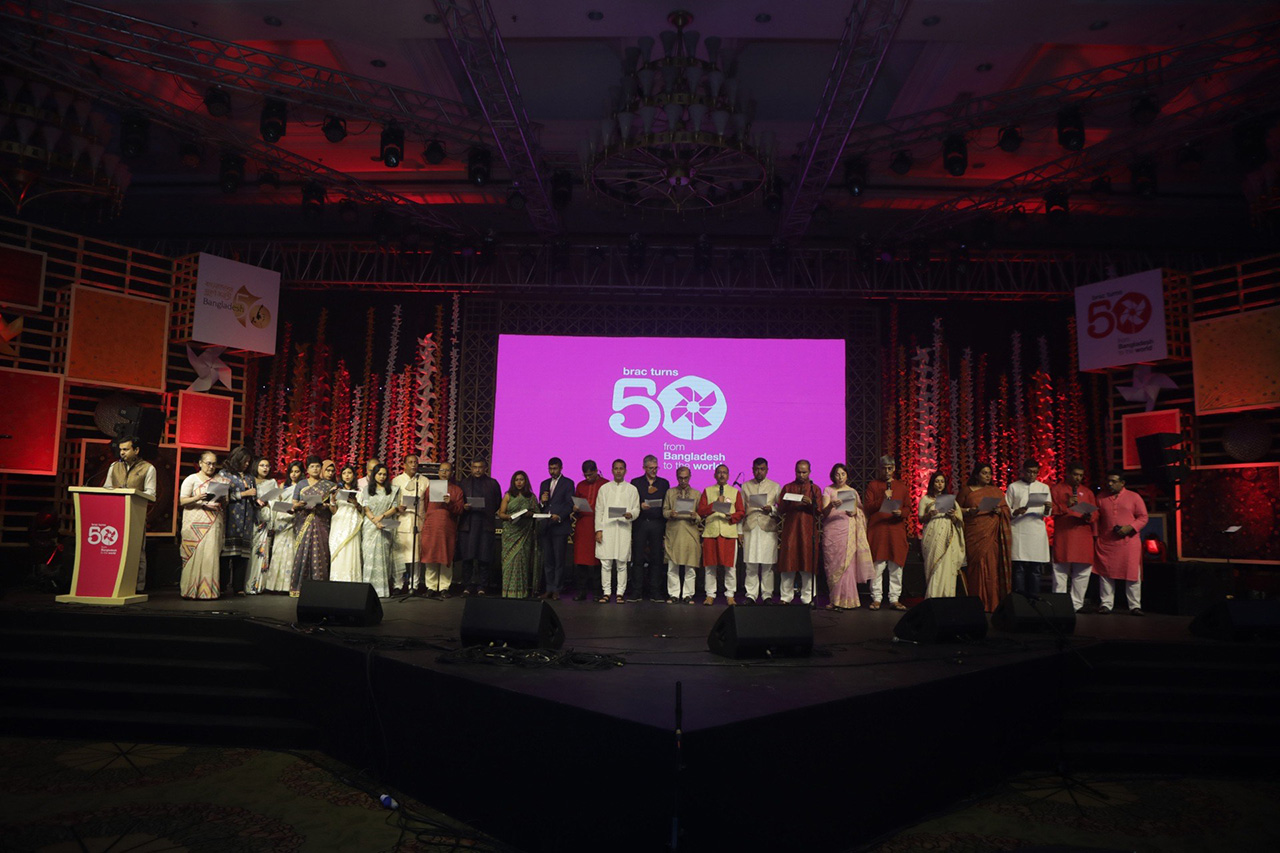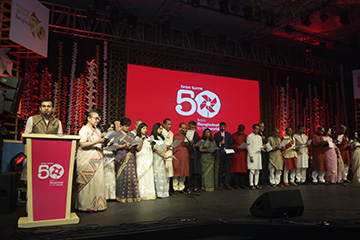
For the last 50 years BRAC has been with the people, particularly with those left behind, and will remain so in future. The work it is doing to assist the underprivileged to become self-dependent not only in Bangladesh, but also in nine other countries, will be reinforced. As ever, BRAC will continue its future actions following the development philosophy of its founder Sir Fazle Hasan Abed that “never lose sight of the mission to extend a hand to those who need it the most”.
BRAC leadership made this pledge at its golden jubilee celebration event today on Monday (21 March). An elaborate programme was organised to observe the occasion at the Bangabandhu International Conference Center (BICC). The whole programme was divided in two sessions, the first of which was attended by the present BRAC staff along with the former ones. The second part of the event in the evening was attended by distinguished guests – high officials from government and private organisations and eminent personalities from education, health, sports, entertainment and media sectors. Discussions, display of audio-visual materials on a host of BRAC programmes and cultural performances comprised the programme of the day. Besides Dhaka, the day was celebrated at BRAC’s divisional offices also.
At the programme, honourable foreign minister Dr AK Abdul Momen read out the message from the honourable prime minister sent on the occasion of the golden jubilee.
Every year the organisation observed its founding anniversary styled “BRAC Day”. The golden jubilee celebration, however, has been observed in a much more festive mood. As a part of the celebration, 16 members of BRAC staff have been honoured with Sir Fazle Hasan Abed Values Award for their outstanding contributions.
Asif Saleh, executive director, BRAC Bangladesh, said while addressing the audience, “Our founder would say he had seen men to be defeated but never had he seen women to be beaten. That is why empowerment of women is one of the most important driving forces of social progress. BRAC has always remained focused on this.”
He further said, “An organisation sustains through proving its relevance. As such, BRAC will successfully tackle the challenge of proving its relevance at present and in future as it did in the past.”
One of the world’s largest non-governmental development organisation BRAC was founded in 1972 in Sulla, a remotest corner of Sunamganj, to assist the refugees repatriating from India to rebuild their life. Later on, BRAC extended its programmes for other marginalised communities elsewhere with a goal to assist them achieving self-dependence through socio-economic empowerment. Long-term programmes have been designed and implemented based on cottage industry, microloans, health, education, agriculture and food security, human rights, road safety, migration, and urban development.
The first NGO from the global south to have international operations, BRAC now operates in 10 countries in Asia and Africa, engaging with over 100 million people.
In the 1980s, BRAC’s massive army of field workers trained mothers literally in every household of Bangladesh in preparing oral saline with kitchen ingredients. Followed the government’s child vaccination campaign, under which BRAC covered nearly half of the country. These two campaigns contributed to the dramatic decrease in child mortality.
BRAC piloted its innovative school model for children deprived from education. The non-formal primary education model later scaled up across the country and beyond. Till now, in Bangladesh 140 million children graduated from these schools to continue their education. In 2001, BRAC Bank and BRAC University were founded.
Next year (2002) the famed Ultra Poor Graduation model was launched. BRAC International began its journey to spread this model worldwide.
Aligned with the changing needs of the nation, BRAC in Bangladesh now is focused more on urban poverty alleviation and skills development and employment of the underprivileged youths. Further, we partner with the Bangladesh government as the largest non-government service provider in the ground tackling the Rohingya crisis and Covid-19 pandemic. BRAC’s engagement with the Bangladesh government has deepened in the process of formulation of socio-economic policies and strategies.
All the programmes, activities and models of BRAC, the BRAC brand itself, have been built around the empowerment of women. Unrelenting, we pursue the goal of creating opportunities for women to realise their full potential.
BRAC will deeply engage with the marginalised people, government and other development partners to identify future issues and find solutions, and will continue to do so in future, said the organisers.









